

The Canon by Darkaardvark
August 16th, 2008 6:04 PMBut, to the point:
The Harry Potter series of books are fun to read. I enjoy them. But they are beginning to creep into the 'literary' canon-- to the point where they may come to be considered 'classics' or are taught in classes (I know of at least a few classes at various schools devoted solely to reading/analyzing HP books). For an example of this, see one example of Harry's increasing literary importance.
I felt like I needed to amend the literary canon to eliminate these books- not only for others, but for myself. But the point was not to degrade, to belittle the books, but to point out that there are more good books out there. Something short, and to the point:
"Remember, a fun read is just that. It is not literature. Still, enjoy."
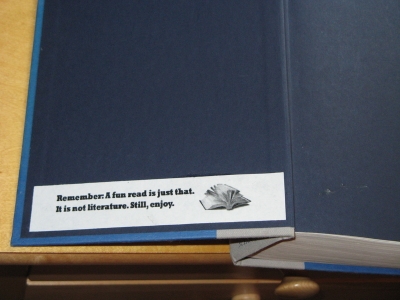
I've attached the messages to my own personal copies of HP books, and intend to continue expanding the message to library books when I can find them on the shelves.
http://sf0.org/Darkaardvark/currentTask/?submit_proof=1
Oddly enough, I actually had forgotten about one of these that I installed when picking up one of these books to read a little while back. The message worked as I intended it- a gentle reminder that I wasn't reading anything particularly mind-expanding, but not to beat myself up over it. I took it to heart, read the book, enjoyed it, and moved on to some more thought-provoking literature.
Free bonus: A mini-Meatspace Droste!
12 vote(s)

Rao
5
Ben Yamiin
5
teucer
5
Jellybean of Thark
5
Tøm
5
Optical Dave
5
Waldo Cheerio
5
Tac Haberdash
5
Icarus
5
Minch
5
Haberley Mead
4
anna one
Terms
(none yet)58 comment(s)
I hope so. Life is busy at the moment, but I don't doubt that there'll be opportunities in the future.
Uninvited stickers must be applied!
Vote in part because I share your opinion. Great read. Not great literature.
And I say this as someone who put enough care into cosplaying as Lupin for the release of book seven that kids were asking if my scars were real.
well, it's a fair distance from saying "not great literature" to what these stickers say which is, "it is not literature."
so fair a distance that I say harrumph
I'm with BU here, and I disagree with the notion that they are "not literature", hence my lack of vote.
In this context, 'good literature' and 'literature' amount to the same thing, at least in the way I am defining them. In the context of the sticker, literature, to me, means the 'literary canon' which is much smaller than 'writing' in general. A large percentage of the books that I read are not what I would consider part of the 'literary canon.'
That being said, I knew (and hoped) that this would invite discussion and likely some controversy, and I would be glad to discuss with people both what they think is 'literature' and whether or not the Harry Potter books meet that standard.
pfft. see, again a shearing off of the argument: the critic now describes "the literary canon." Is that not itself a subset of a broader term "literature?" will we elide literature into a notional single canon? I suppose the noun "canon" allows for it.
Elision is for Bach cello suites, the literary canon may be a subset but it is what the term literature refers to in this context, and canon may be singular but there are more canons than just the literary canon, and Harry Potter goes in one of them.
I argue with the idea that "Literature" and "Good literature" can be conflated. A lot of literature I've been forced to study (and more tragically TEACH) is absolute drek. I'm looking at YOU Steinbeck.
I very much enjoy the work of Steinbeck. Just because authors write in a more common tongue doesn't mean what they have written is not literature. I would argue that Stephen King is literature. As is Shel Silverstein (The Giving Tree may be one of my favorite works of literature ever). I would even go so far as to say that Alan Moore and Neil Gaiman and Warren Ellis and Brian Michael Bendis and David Mack write literature. I really don't see a difference between J.K. Rowling and Shakespeare. Or Gary Gygax and Edgar Allan Poe. Neil Stephenson is just as much literature as Judy Blume is. I don't think literature should be judged by how complex the writing is or what you may or may not have learned when you put the book down.
I'd argue that literature is at the intersection of writing and art on the Venn diagram.
But then we argue over what Art is, and I'm not good enough at that to back up Jubal.
sheesh. a difference between rowling and shakespeare?? lincoln!! harry potter might be as exciting, or as dramatic, or whatever... but he just doesn't have centuries upon centuries of meaning tied to him. at the simplest level it's just cause it's so new. how can we know what it means yet?
not that it's impossible for it to end up meaning more. but there's a bit of a difference. please?
how many worthy quotations are repeated from each book of rowling's? how often does the bard bear repeating? damn near every line?!
The Bard coined 'eyeball', 'flawed', and 'addiction.'
Rowling coined 'muggle' and 'mudblood'.
and expecto patronus! Don't forget that.
Patronum, you half-witted excuse for a fan.
Seriously. It conjures a patronus, but when you're making it the object of expecto it needs to be in the accusative.
Hooray for pseudo-Latin.
"Muggle" actually originated as '30's era Jazz slang. A muggle was a joint.
I love the series, and argued about where there horcruxes must be for months awaiting the seventh book, but I must agree that these texts are entertainment, and not literature. The story is captivating, but the prose is lacking in a heinous way for most of the series, and only improves to bearable levels in the final book.
Here, from page 324 of The Order of the Phoenix, to give you a typical example, are six consecutive descriptions of the way people speak. "...said Snape maliciously," "... said Harry furiously", " ... he said glumly", "... said Hermione severely", "... said Ron indignantly", " ... said Hermione loftily". Aside for the occasional and laudable passages that inspire a childlike suspension of disbelief, the writing is unbearably plodding and infantile during emotional character interactions, and if you can't see this then you are self-evidently someone on whom the possibilities of the English language are largely lost.
This is the kind of prose that reasonably intelligent nine-year-olds consider pretty hot stuff, if they're producing it themselves; for a highly-educated woman like Rowling to knock out the same kind of material is, I hate to say, somewhat disappointing. Children exposed to this kind of writing aren't learning anything new about words. Harold Bloom got it right as he points out they're not going to be inspired to go off and read the Alice books, or any other enduring classic.
The books are dear to my heart, but more for happiness and amusement they brought me than for taking me places I had never been.
I agree a lot with what Bloom has to say. I have a younger cousin who is very into the Harry Potter books, to the point of obsession. I once asked her what she thought of Eragon. "It sucks."
"Oh? Why?"
"..."
"Have you read it?"
"No. Why would I read it?" She went on to explain how there really wasn't a point to reading any fantasy that wasn't Harry Potter, as it wouldn't be as good.
Now, I'm not suggesting that Harry Potter is to blame for 'trapping' readers into reading nothing else, nor am I suggesting Eragon as a viable alternative (I was trying to encourage her to read something else) to other books. But it is clear that reading Harry Potter and nothing else is pretty damn silly, and it is disappointing to see someone unwilling to branch out to try new things.
i don't like this task because it insults the members of the public who will interact with it.
I like this task because it dares to insult the members of the public who will interact with it.
i'm insulted by public interaction with members
I dismember the insulted public.
I dismember the members of the insulted. Pubicly. Er, publicly.
And if nobody comment votes these 6 comments, it'll count down from 6 to 0.
oops. I missed what was going on, so I accidentally voted DA down. I'm sorry. I am too trigger-happy.
Also, c-c-c-c-combo breaker.
The best part is eventually somebody's comment is going to get hidden as bad content just to continue the pattern. And I bet it'll be something really insightful, too, rather than some dumb observation of how the conversation is running.
Then we shall have to do our very best to insure the rest of this thread is filled with dumb observations of [sic] how this conversation is running.
Man, this conversation sure is running. Look at it go!
I totally agree with what you're doing and I'm not going to vote right now.
Oh my goodness. I'm all a twitter with excitement about this thread.
First, let me please say - as one who studied Shakespeare in college - when he wrote, he was not writing great literature, or with the intention of being quoted everyday, he was writing to entertain.
JK (god bless her muggle soul) did not write to write great literature, she wrote to entertain, and to give life to the lovely world inside her mind.
It is the public that made Shakespeare great. It is our love for his words and stories, our desire to quote him over and over and over again, that has made him a long standing canon in literature.
When Shakespeare's next play came out, did his public dress in costume and line up outside the theater days in advance simply to be the VERY FIRST ONE to see it? Possibly. Did his public buy his plays and read them all in one sitting start to finish, refusing water or sustenance until they had read the final line, only to then run to their neighbors house to see where they were in the story, waiting impatiently for someone to discuss the climax with? Possibly. Did Shakespeare's writing create such a mad rush of enthusiasm that children (and adolescents and adults) started reading again on a mass scale with a fervor not seen in ages. Possibly.
Did Rowling do all those things. Yes!
Harry Potter may not have been written with the language of Shakespeare (but let's be fair here, Shakespeare wrote with the language of Shakespeare because that was the language of his time). Comparing the two would be like saying, "Minch, what you say is nice, but you're not speaking Italian, and Italian is so beautiful, I refuse to listen to you unless you speak in Italian." (or something like that).
Rowling made writing EPIC again. The way Star Wars made movies EPIC (I refer only to the originals and their re-release, not at all to the tripe that are the prequels).
All that said, I do love the idea of this task; but more so love the discussion it's provoked. So I will vote, simply for creating passion in others.
Harry Potter may not have been written with the language of Shakespeare (but let's be fair here, Shakespeare wrote with the language of Shakespeare because that was the language of his time). Comparing the two would be like saying, "Minch, what you say is nice, but you're not speaking Italian, and Italian is so beautiful, I refuse to listen to you unless you speak in Italian." (or something like that).
For that matter, there was a time (circa 1300) when Italian wasn't something people thought of as beautiful, so it wasn't something any serious writer would normally consider writing in. Italian was a base language for common folks; serious writing was all done in Latin.
And then a poet in Italy decided to make waves by writing in a somewhat erudite form of his native Tuscan, and to defend his choice with a Latin tract called De Vulgari Eloquentia - "on the eloquence of vernacular" arguing that the Romance languages as they were then spoken, and the Italian dialects in particular, were wonderfully expressive languages for poetry. His work made waves in the early fourteenth century, in part because he was writing serious literary things using a language that wasn't the norm for such things.
But now, seven centuries later, everybody agrees Dante Alighieri's work belongs in the canons of great literature.
As for this task: personally I think it premature to regard Harry Potter as serious literature; people read it solely for its entertainment value rather than for its commentary on the human condition. It's not at present fulfilling the function Shakespeare serves, and Darkaardvark is right to exclude it from the present day literary canon.
But a century from now, if its cultural impact lasts, that could change. Rowling probably isn't the Shakespeare of our day, but she might turn out to be its Jane Austen.
"Rowling probably isn't the Shakespeare of our day, but she might turn out to be its Jane Austen."
Dok, I love you :)
uhm.... and also... (yeesh I'm such an effing nerd) Rowling DOES coment on the human condition. ALL of Harry Potter (and her soon to be released book of fairy tales) are stories of the power of friendship and acceptance. You can make so many correlations between her stories and the state of the world today, so I have to argue that she does, very much, speak to the human condition... she just does it with teens, at a magic school.
oh, and also... also, most of what she writes about is already having the power within yourself to acomplish what you dream of, and the journey of her stories is finding the strength to realize you already have that power.
If that's not the human condition, then I am living on mars.
Oh, I'm not saying she doesn't speak to people. I'm just saying that's not the main motivation for reading it. People read the books because they're fun, and the fact that like almost any good book they have more to them than that is a happy side effect. But if people are reading them a hundred years from now, that deeper stuff will by why. The jury's still out on whether there's enough of it there for Rowling's influence to last, which is why I wouldn't yet put her in the canon - but the fact is she might get there someday.
The same was true for Shakespeare, more or less. People didn't go see Henry V because it portrayed a sovereign with a complex attitude toward war, they went and saw it because it involves at least as much awesomeness as anything Chuck Norris was ever in. But if it had merely been badass and not also deep, we'd all have forgotten about it by now except for a few specialist scholars.
well then, my dear Dok, here's to being badass and also deep!
::clinks glasses with Dok and drinks::
All that said, I do love the idea of this task; but more so love the discussion it's provoked.
Every time someone continues the thread of discussion it's like a vote, but even better because I know they put thought into it.
Hear, hear.
::clinks glasses with Minch, then suddenly realizes he plans to be at the wrong awesome event this St. Crispin's::
oh, and also... also, most of what she writes about is already having the power within yourself to acomplish what you dream of, and the journey of her stories is finding the strength to realize you already have that power.
Clearly she must be this generation's L. Frank Baum.
Not the most elegant collection of sentence constructions, but a thrilling and often moving and archetypal fantasy nonetheless. (Bless him and the entire Oz series. Read them.)
All right, everybody that thinks Rowling should be excluded from the literary canon, I have a question. Is Shel Silverstein in the canon? Is William Gibson?
What are the qualifications one must meet to get into the canon? Is Allan Moore? Where is the line drawn? Who draws it?
My answer, personally, is yes to Silverstein and no to the others. None of them have done anything with a noticeable lasting place in our shared cultural knowledge (the lasting part means some of them still might), unless you count people who affect only geeks.
Except Silverstein. Sure, there are a lot of people who don't remember "The Mungle and the Mun" or, for that matter, his work in rock music - but who in America today wouldn't recognize a reference to The Giving Tree?
The fact that he has worked his way into America's collective unconscious and stayed there for decades shows us that his work will have a real lasting impact. I imagine Rowling will too - but it's still far to early to call it.
William Gibson hasn't "done anything with a noticeable lasting place in our shared cultural knowledge"? Seriously?
Not that's significantly impacted non-geeks, no.
Ask your average non-geek about William Gibson, and they will have no idea who you're talking about. Ask them if they've read Neuromancer, and they will say no. Sure, as a geek, I can quote the first sentence of Neuromancer without having read it - but for most of the English-speaking world the existence of his work does not affect their life one whit.
Gibson kicks ass. But the truth is he hasn't really infiltrated the cultural commons even as much as Shel Silverstein.
- There's plenty of debatable, older work that might be more comparable to Mr. Potter's eventual position. Alexandre Dumas (pére) probably isn't on many people's short list, but The Count of Monte Cristo and The Three Musketeers are still very well-known (and still fun to read)!
- I like to think of canon-ness as referring to to a work's ability to remain relevant to changing societies and (specifically) shifts in academia. There's already some talk of the fantasy boom as a symptom of a contemporary inability to imagine utopias in the future, and JK arguably fits into those discussions already. And very little could stand up to the Shakespeare standard; 400 years later, and the plays are still trotted out as exemplars of just about any new social or critical theory. Can that be said of any other body of work?
- There's plenty of debatable, older work that might be more comparable to Mr. Potter's eventual position. Alexandre Dumas (pére) probably isn't on many people's short list, but The Count of Monte Cristo and The Three Musketeers are still very well-known (and still fun to read)!
Yeah, that's true. And perhaps a very likely fate for Potter, more so than being clearly in or clearly out. (JJason and I were debating about Gibson's position this morning, and I think he's in that same gray area, really.)
And of course what goes into the canon varies by culture, and language. It wouldn't surprise me if Dumas was on everybody's list (if not the short version) in France, for instance, though I don't know for sure. And in Spain, most people will put Lazarillo de Tormes on the list, not all that far under Cervantes - but in America, only us renaissance Spain buffs have even heard of it.






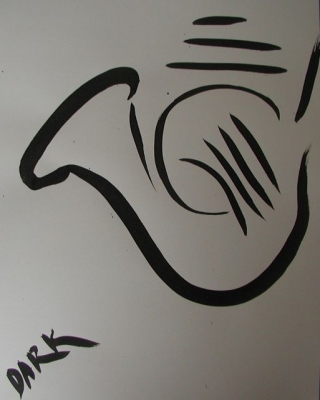













.jpg)







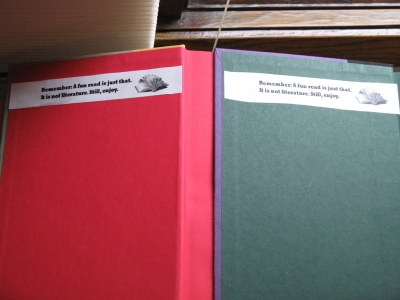
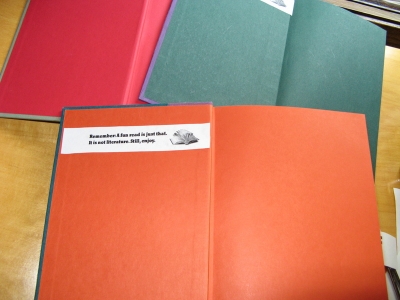
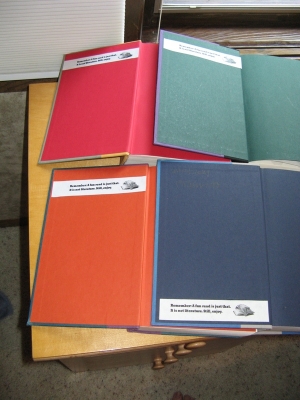
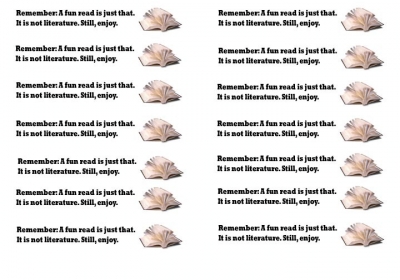






















That's a pretty good take on this.
Will you be posting your progress as you proceed?